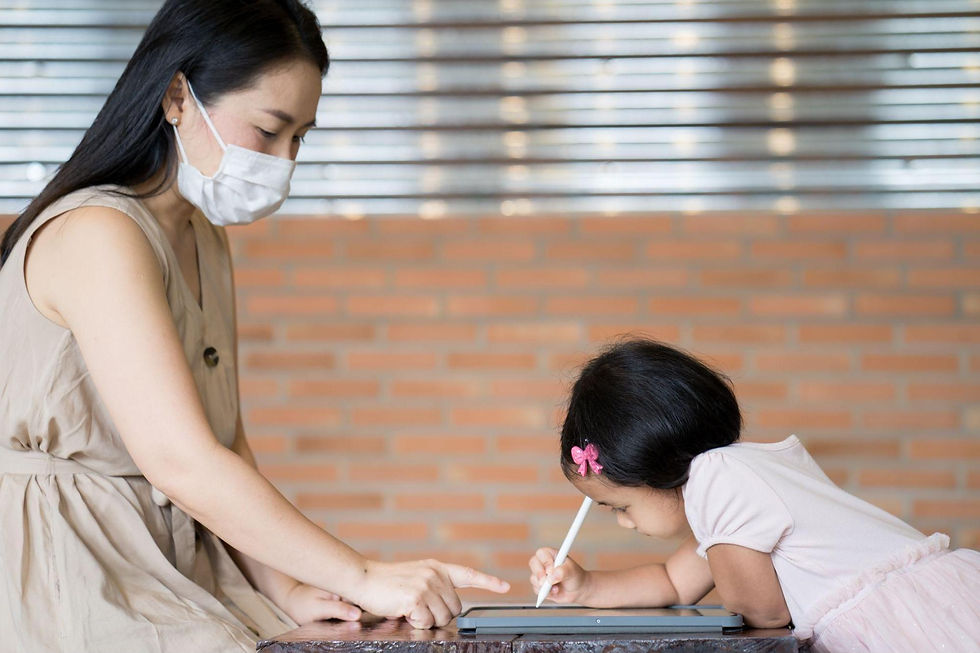A Guide on How to Help Kids with Learning Disabilities
- Everyday Heroes
- Jan 14
- 4 min read

Learning difficulties affect many children worldwide, including Singapore. In fact, according to MOE, about 35,500 students are reported to have special education needs as of December 2022. These challenges often impact a child’s ability to learn, communicate, and socialise effectively. However, with the right support, children with learning disabilities can thrive academically and socially.
What is a Learning Disability?
Learning disabilities are neurological conditions that interfere with the ability to acquire, process, or retain information. It’s important to remember that these challenges are not indicative of a child’s intelligence but rather of the specific way their brain processes information.
Some of the common types of learning disabilities include dyslexia, dysgraphia, dyscalculia, and auditory or visual processing disorders.
How Do I Know if My Child Has a Learning Disability?
Identifying a learning disability early can significantly affect your child’s growth and development. Some key signs to look out for include academic struggles like difficulty reading or writing, social challenges like trouble interacting with peers, and behavioural issues, like avoidance of academic tasks.
If you notice these signs, consider seeking a professional evaluation. Educational psychologists, therapists, or specialised educators can perform assessments to identify specific learning disabilities and recommend tailored interventions. Early diagnosis paves the way for appropriate support and accommodations.
How to Support Children with Learning Disabilities
Supporting your child with a learning disability requires patience, understanding, and a well-rounded approach that addresses their unique challenges while building on their strengths. These are some practical tips to consider on how to help kids with learning disabilities:
1. Gather More Information About Your Child’s Learning Disability
Understanding your child’s specific learning disability is the foundation of practical support. Each condition, such as dyslexia, ADHD, or dyscalculia, presents distinct challenges. Research the condition thoroughly to understand how it impacts your child’s learning process and behaviour.
You can also consider delving into the different evidence-based strategies recommended to your child and tools or technologies that could support their learning. Equipping yourself with this knowledge not only empowers you to make informed decisions but also helps you advocate for your child with confidence.
2. Work with Professionals
Children with learning disabilities benefit significantly from a multidisciplinary approach involving professional collaboration. Building a team of experts ensures your child receives comprehensive support:
Educators: Partner with teachers to create an Individualised Education Plan (IEP) or other customised strategies to accommodate your child’s needs in the classroom.
Therapists: Engage speech, occupational, or behavioural therapists to address specific developmental or emotional challenges.
Educational Psychologists: Consult with experts who can provide assessments and recommend intervention strategies.
Regular communication and goal-setting with these professionals ensure your child receives consistent and adequate support.
3. Be an Advocate for Your Child
As a parent, you play a vital role in advocating for your child’s rights and needs. Advocacy involves ensuring your child has access to the right resources, accommodations, and opportunities. One way to do so is by working closely with teachers and other school staff to implement accommodations such as specialised learning materials or modified teaching methods that suit your child’s learning style.
4. Plan for the Future

Supporting your child extends beyond their immediate academic needs. It’s important to prepare for their long-term success by focusing on life skills, career readiness, and independence. Some of the ways you can prepare for your child’s future include:
Set Realistic Goals: Work with your child to identify achievable milestones for education, career aspirations, and daily living skills.
Explore Opportunities: Research vocational training, internships, or higher education programs that cater to individuals with learning disabilities.
Teach Life Skills: Incorporate essential skills such as time management, money handling, and self-advocacy into your child’s routine to help them build independence.
5. Reach Out to Support Groups
Engaging with support groups can provide invaluable guidance, encouragement, and practical solutions as you navigate the unique challenges of raising a child with learning difficulties. Local community organisations like SHINE offer programmes and services designed to support parents and children alike. Moreover, online forums and social media groups can be a great place for exchanging ideas, sharing experiences, and discovering tools and resources that have worked for others in similar situations.
These networks not only offer practical advice but also create a sense of belonging and reassurance that you’re not alone in your journey.
How Can SHINE Help?
SHINE is a Singapore-based charity committed to empowering children and youth facing learning challenges to reach their fullest potential. By offering programmes and expert support, SHINE seeks to bridge the gap between learning difficulties and success in education and life.
One of our core services is the Educational Psychology Services (EPS), which provides comprehensive assessments and evidence-based interventions for children and youth with learning disabilities. This helps identify specific challenges, enabling personalised strategies that foster optimal learning outcomes. Additionally, SHINE offers Family Coaching Programmes, which equip parents with practical tools and strategies to create a supportive home environment that complements their child’s educational needs.
Beyond academic support, SHINE also addresses emotional and social well-being through its Children and Youth Counselling Services. These services help children build confidence, develop coping mechanisms, and strengthen their emotional resilience as they navigate the challenges associated with learning disabilities.
Our charity for children and the youth also serves as a vital resource for families, connecting them with a network of support and community programs to ensure they do not feel isolated in their journey. With SHINE’s holistic approach, children with learning disabilities and their families can access the resources, guidance, and encouragement they need to thrive.
For more insights on how you can contribute to the community, check out these ways on how you can help youth and children from disadvantaged backgrounds.

Comments